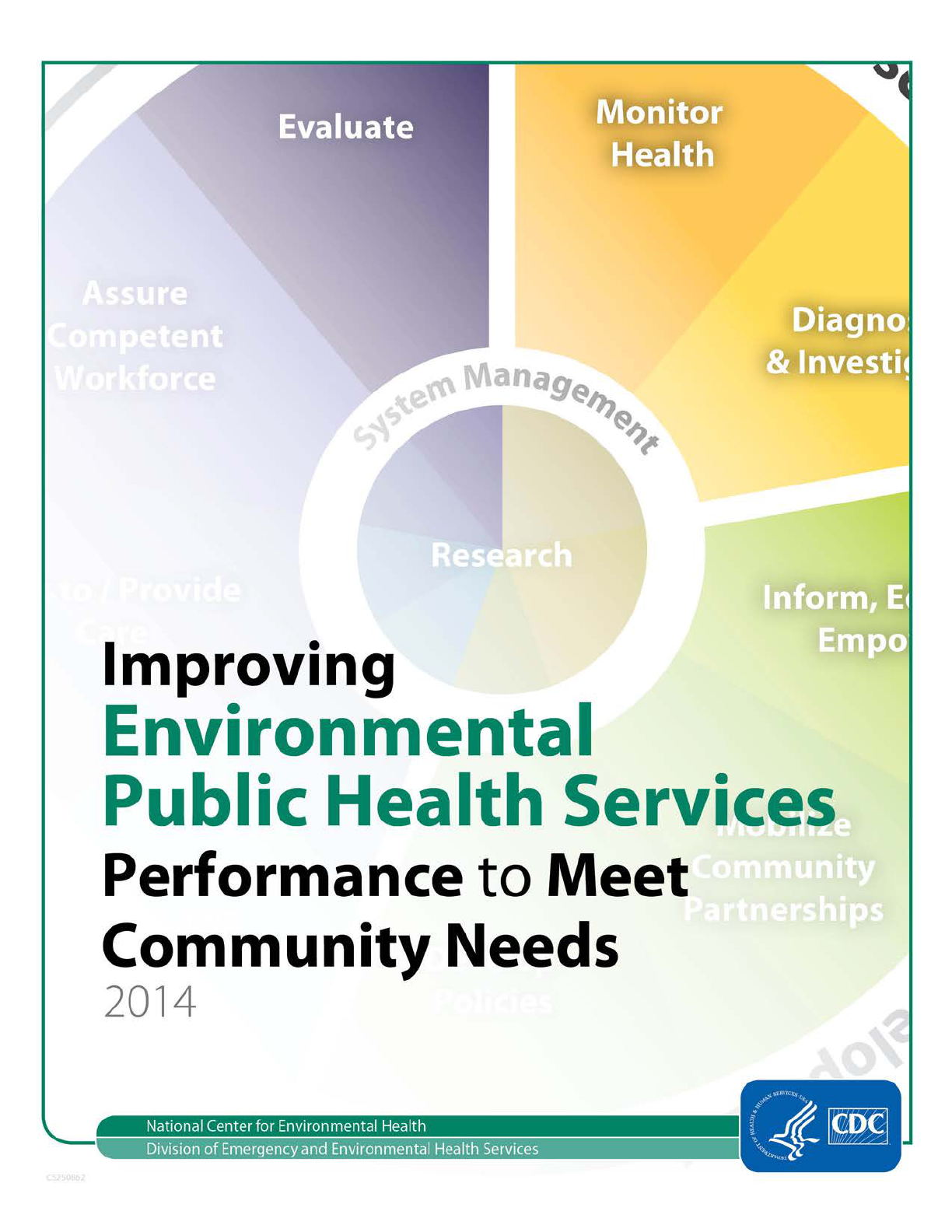

Improving Environmental Public
Health Services Performance to Meet
Community Needs
E
nvironmental public health (EPH) programs can
substantially enhance public health department
goals to improve performance and quality of
services. They also can contribute to and benefit
from collaborations to improve public health efforts
throughout the department. This document
• describes public health and EPH performance
improvement initiatives and resources,
• explains how EPH performance improvement
activities can be incorporated into public health
department efforts, and
• shows how performance improvement
resources can be used to support a strong role
for EPH in improving community health.
Activities to improve public health performance
have been elevated to new levels in recent years.
Surveys conducted by the Association of State and
Territorial Health Officials (ASTHO) and National
Association of County and City Health Officials
(NACCHO) indicate performance improvement is
a priority for many state and local health agencies.
Improving the effectiveness and efficiency of public
health services is at the root of this activity. Public
health departments are encouraged to identify gaps
in providing essential services and incorporating
community needs to better inform priorities and
make decisions. Public health performance has
been improved and supported by developing
guidance and resources and has been encouraged
through initiatives and funding opportunities.
National initiatives supporting and encouraging this
wave of improvement include the following:
• Voluntary Accreditation for Public
Health Departments – The Public
Health Accreditation Board (PHAB) is a
nonprofit organization founded in 2007.
PHAB’s goal is to advance public health
performance by providing a national
framework of standards for tribal, state,
local, and territorial health departments.
PHAB is the national organization charged
with administering the public health
accreditation program. Prerequisites
of accreditation include a community
health assessment, community health
improvement plan, and health department
strategic plan.
• National Public Health Improvement
Initiative – This CDC initiative provides
support to health departments for
accelerating public health accreditation
readiness activities, implementing
performance and improvement
management practices and systems, and
implementing and sharing practice-based
evidence.
• Patient Protection and Affordable Care
Act – This law requires nonprofit hospitals
to conduct a community health needs
assessment every 3 years to maintain their
nonprofit status. They also must involve at
least one representative with public health
expertise and develop an implementation
plan to meet identified needs.
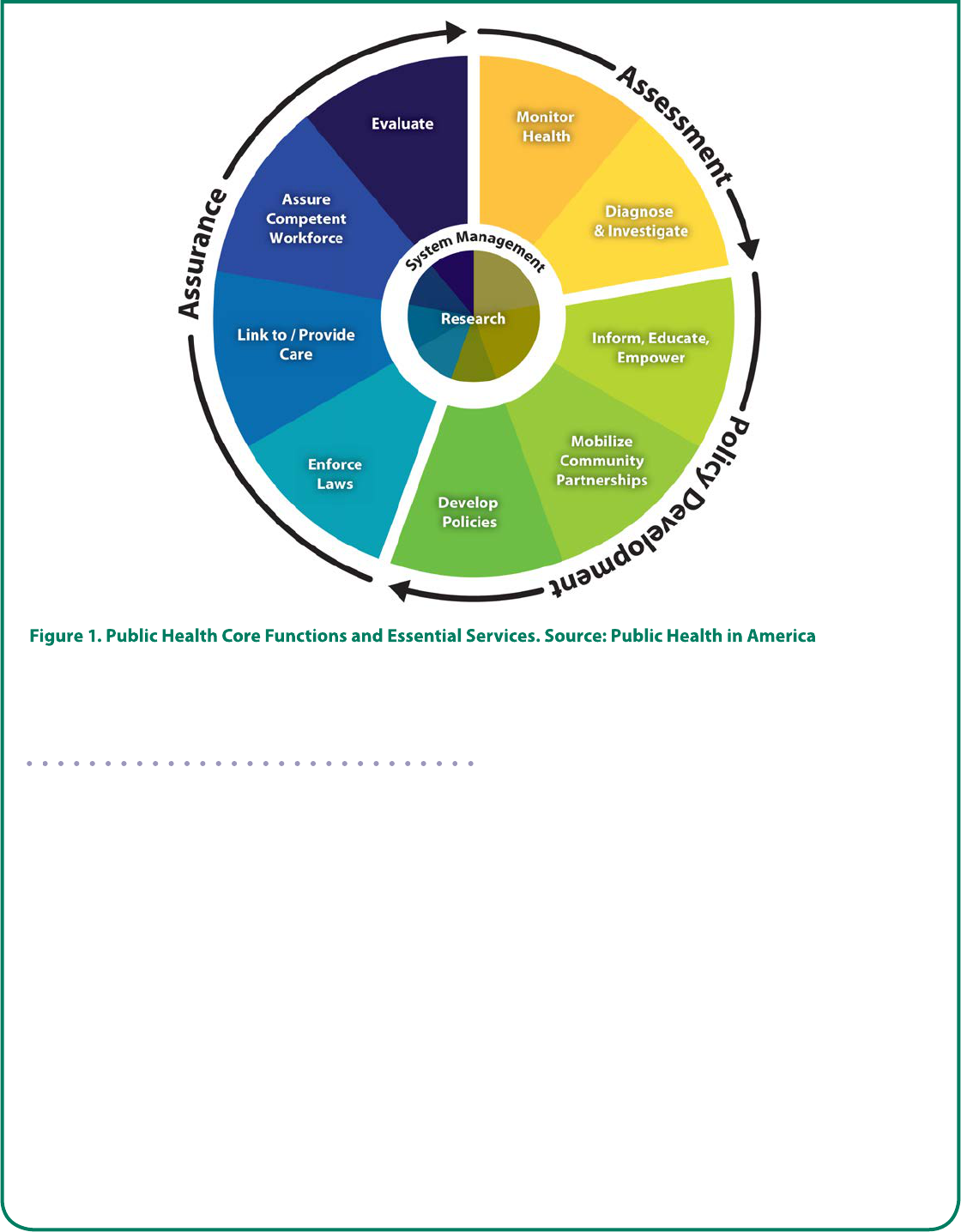
Page 3
Improving Public Health
Performance
Improving public health performance has been an
evolving process, fueled by the 1988 release of the
Institute of Medicine’s report The Future of Public Health.
The report identified three core functions: assessment,
policy development, and assurance (Figure 1).
In 1994, the U.S. Department of Health and Human
Services coordinated the Public Health Functions Project,
with national representation, to describe public health
services. This collaborative project produced a statement
called “Public Health in America” that identified 10
Essential Public Health Services.
In 2002, the Centers for Diseases Control and Prevention
(CDC) released the National Public Health Performance
Standards Program (NPHPSP), a public health system
assessment framework based on the essential services.
To complement assessment of public health system
services, community health assessment and strategic
planning emerged as key mechanisms for describing
and meeting population health needs. In response, CDC
and NACCHO released Mobilizing for Action through
Planning and Partnerships to promote a community-
driven, strategic-planning process for improving
community health.
While resources to improve public health performance
were developed and released, work was under way to
develop guidance and tools specific to EPH (Figure 2).
By 2002, the 10 Essential Public Health Services were
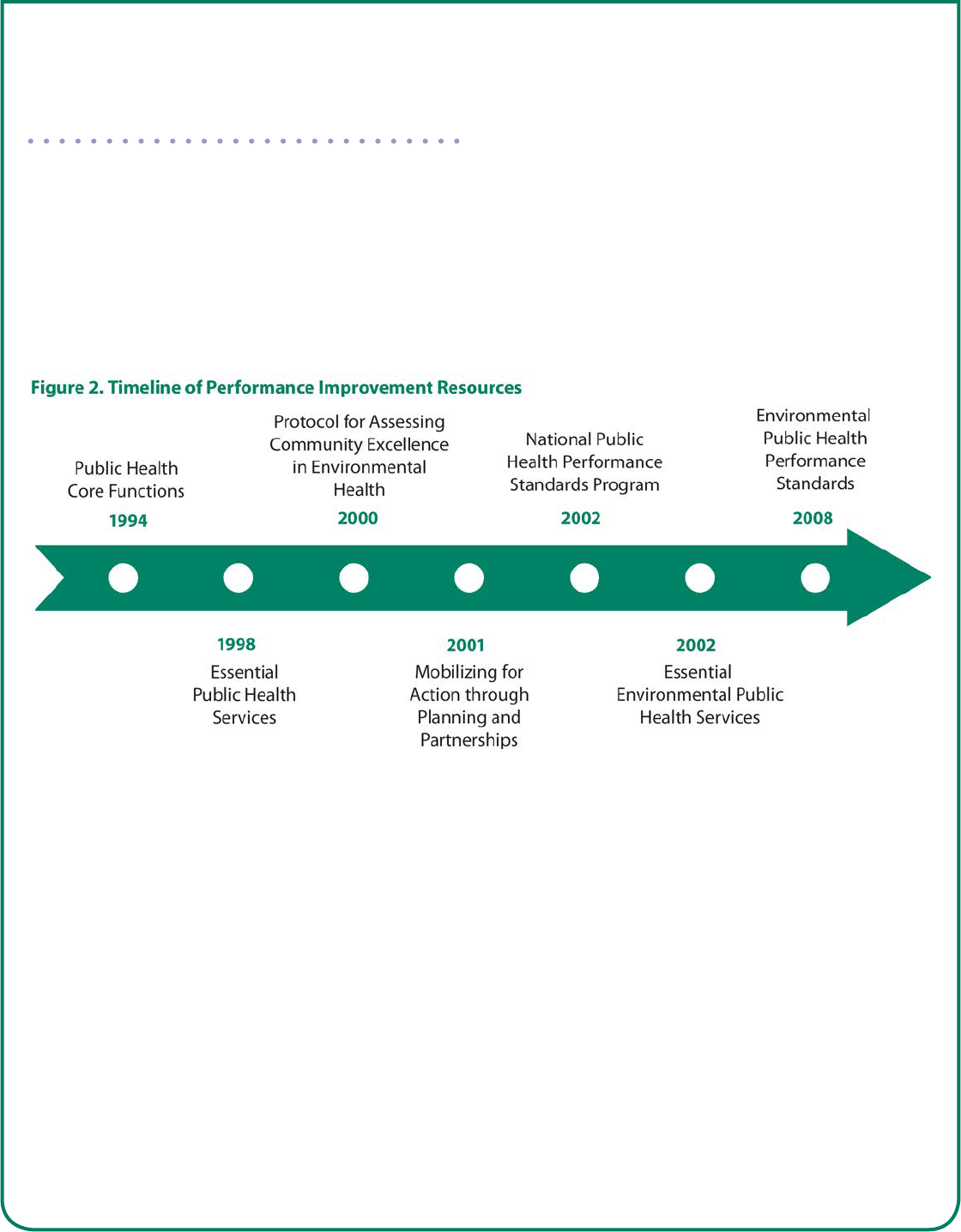
Page 4
Improving Public Health
Performance (continued)
adapted to fit EPH by creating the 10 Essential EPH
Services (text box). Subsequently, CDC released the
Environmental Public Health Performance Standards
(EnvPHPS) in 2008 to improve the EPH service delivery
system. These standards complement NPHPSP while
specifically representing EPH.
EnvPHPS describes the optimal performance and
capacity for EPH systems and programs and provides
program-assessment tools. The purpose of these
standards is to help make EPH programs and systems
more effective. The standards are used to assess
and improve how programs and systems provide
communities with the 10 Essential EPH Services. These
10 services identify the actions necessary to protect and
improve EPH.
In 2000, NACCHO and CDC released the Protocol for Assessing Community Excellence in Environmental Health
(PACE EH) to address community environmental health needs. PACE EH guides communities and local health
officials in assessing community-based environmental health. It uses community collaboration and environmental
justice principles to help the public and other stakeholders identify local environmental health issues, set priorities for
action, target populations most at risk, and address identified issues. PACE EH helps implement the 10 Essential EPH
Services.

10 Essential Environmental Public Health Services
Monitor environmental and health status to identify and solve
community environmental public health problems
Diagnose and investigate environmental public health problems
and health hazards in the community
Inform, educate, and empower people about environmental public
health issues
Mobilize community partnerships and actions to identify and solve
environmental health problems
Develop policies and plans that support individual and community
environmental public health efforts
Enforce laws and regulations that protect environmental public
health and ensure safety
Link people to needed environmental public health services and
assure the provision of environmental public health services when
otherwise unavailable
Assure a competent environmental public health workforce
Evaluate effectiveness, accessibility, and quality of personal and
population-based environmental public health services
Research for new insights and innovative solutions to environmental
public health problems
Page 5

Page 6
Performance Improvement: Using Assessment Results
Each assessment process produces individual results.
Assessment results can complement each other and
combining them in an action plan helps to reflect
department and community needs. Developing and
implementing action plans to address identified gaps
and needs ensures findings result in meaningful change
Because prioritizing actions is necessary, the PACE EH
process has a built-in prioritization tool. The tool can be
modified for other assessment processes. Conducting
assessments will enable programs to identify
• concerns or service gaps that can be further
prioritized if desired,
• possible solutions to the priority problems based
on discussions during the assessment, and
• a stakeholder group (whether department or
community-based) that can help implement
solutions.
.
Return on Investment
Gathering data and obtaining assessment results does
not guarantee impact. Rather, the process and outcome
must yield a return on investment (illustrate how the
data and results can produce benefits). Acquiring
meaningful results, using those results, and, most
importantly, leveraging resources can ensure successful
implementation of action plans and produce tangible
results.
Partnerships formed during the data gathering and
assessment processes often leave community partners
with a newfound sense of empowerment. This added
benefit stems from their active involvement and direct
engagement with improving health status within their
community.
Read about how West
Wabasso, Florida,
contributed to broader
public health goals and
processes.
Return on Investment:
Florida Department of
Health in Indian River
The small community of West Wabasso implemented
PACE EH. With a median household income of $6,250
(2000 Census), West Wabasso has a demographic and
socioeconomic makeup that is drastically different
from the surrounding Indian River county, one of the
wealthiest counties in Florida.
The PACE EH steering committee garnered media
attention and gained support from county decision
makers for project activities that responded to
the community’s concerns. In addition, the health
department staff successfully transitioned project
coordination to the community. A community group
that grew out of the process conducted a visioning
process to make long-term plans. Because of the sur-
vey and strong partnerships inspired by PACE EH, sev-
eral community-identified improvements were realize
e
y
d
s
y
k
e
in West Wabasso. Those improvements include
• installation of 44 streetlights throughout the
community,
• replacement of 10 septic systems most in need
of repair,
• assistance from a youth ministry program that
brings youth volunteers to build or repair hous
in the community,
• connection of homes in West Wabasso to count
water ($850,000 Community Development Bloc
Grant), and
• improvements to local parks.
To date, an initial investment of $30,000 by the
Florida Department of Health for the PACE EH Coor-
dinator’s salary has yielded more than $1.3 million in
community improvements. The value of a communit
empowered to improve its health and quality of life is
immeasurable, and this qualitative measure is of valu
when computing return on investment.
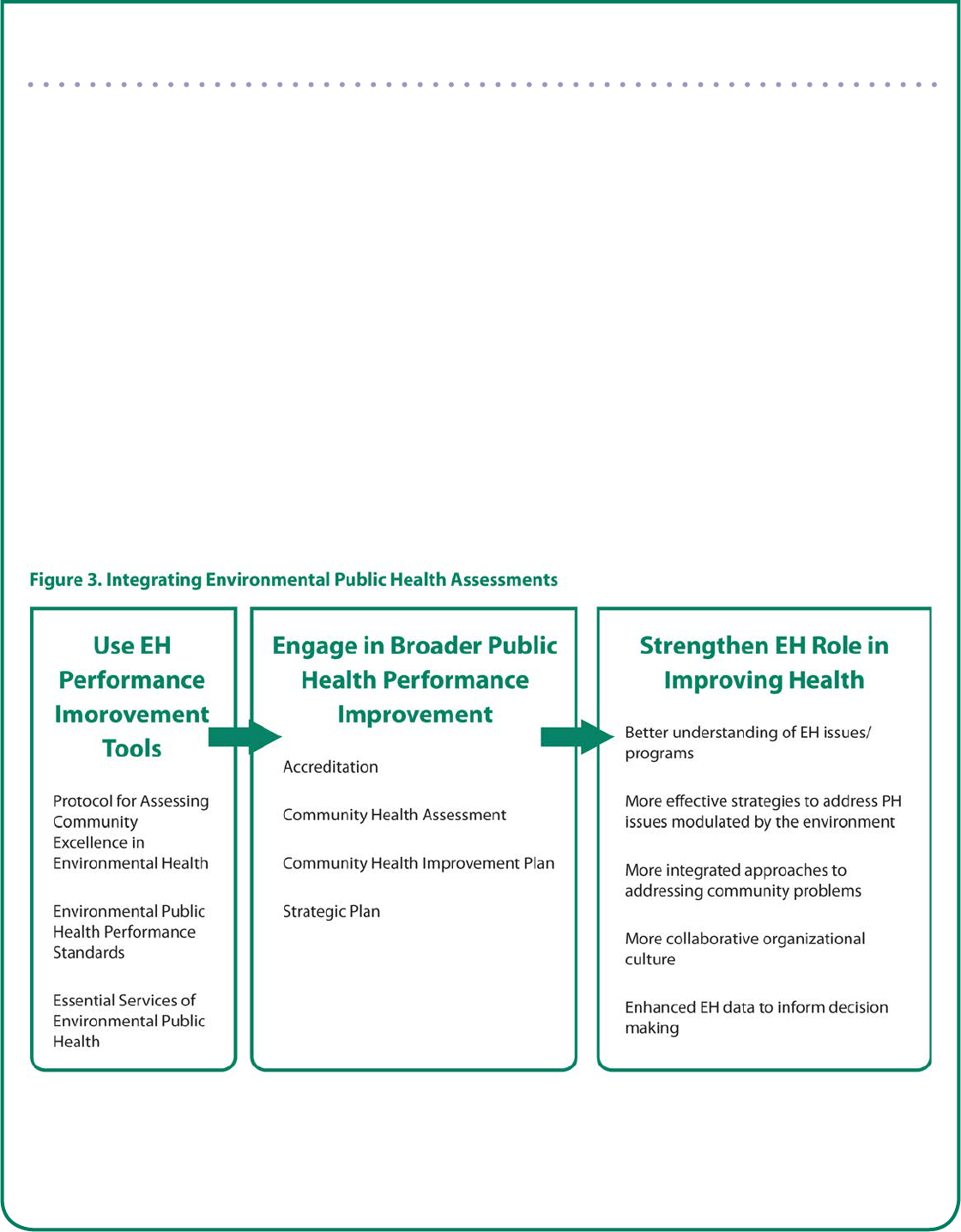
Page 7
Performance Improvement: Using Assessment Results
EPH assessment results can be integrated with
broader public health department improvement efforts.
Getting involved in those broader assessment and
action-planning activities can help build and nurture
partnerships (Figure 3). Relationships can lead to greater
understanding of how EPH is helping achieve broader
public health goals and can prove the importance of EPH
approaches to other public health department programs.
In turn, this may lead to other opportunities such as
enhanced support for EPH programs.
PHAB’s voluntary accreditation process presents a
significant performance improvement opportunity to
integrate EPH assessment results. Health departments
seeking accreditation must submit a community healt
assessment, community health improvement plan, and
strategic plan. These documents drive voluntary
accreditation; they also ensure that EPH concerns are
included and that environmental health approaches
to addressing broader problems are recognized and
supported.
There are areas of alignment among EnvPHPS, PACE
EH, and PHAB standards. Information from PACE EH or
EnvPHPS assessment processes can support health
h
Contributing to Broader Public
Health Goals and Processes
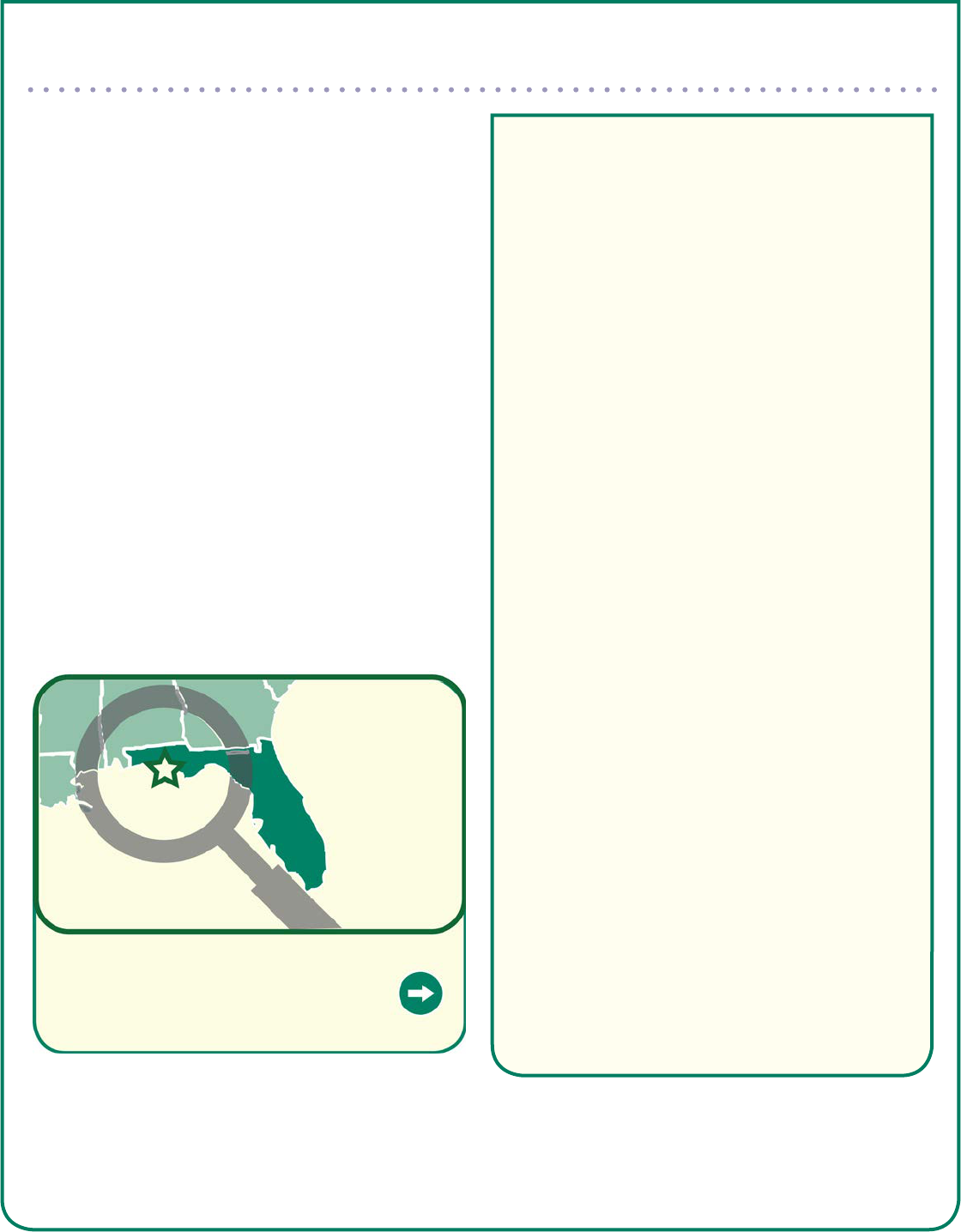
Page 8
Read about how Walton County,
Florida, contributed to broader public
health goals and processes.
Performance Improvement: Using Assessment Results
Contributing to Broader Public
Health Goals and Processes
(continued)
department fulfillment of certain PHAB standards. Table 1
highlights the alignment among PHAB domains, EnvPHPS
standards, and PACE EH activities.
Environmental factors can influence broader public
health goals such as reducing obesity. For example,
sidewalks and safe, accessible parks are enhancements
built into the environment to encourage physical activity.
Identifying areas of alignment between community
environmental health concerns and broader public health
goals can reveal approaches that address both. Activities
to improve performance help identify community
environmental concerns and potential beneficial
strategies. These activities also help communities align
with broader efforts to improve public health goals and
strengthen environmental health’s role in improving the
public’s health.
Contributing to Broader
Public Health Goals and
Processes: Walton County,
Florida
The Walton County Health Department’s Division
of EH (environmental health) and a stakeholder
group (the EH Council) worked with police
departments, schools, community organizations,
and local government using the EnvPHPS to
assess environmental health capacity and needs.
Meanwhile, the health department developed
the County Health Improvement Plan (CHIP), a
prerequisite for accreditation. The CHIP cohort
used Mobilizing for Action through Planning and
Partnerships, while the council members used PACE
EH to assess and develop action plans.
Early in the CHIP process, the Division of EH realized
they should be active in the county’s health
improvement planning initiatives. CHIP stakeholders
learned that many root causes for chronic diseases
link directly to environmental factors. They composed
specific strategies to address both the community’s
EH concerns and the environmental causes of chronic
disease. For example, CHIP stakeholders created a
“garden in a bucket” initiative to encourage families
to plant small container vegetable gardens and
prepare and enjoy nutritious meals together. The
National Association of County and City Health
Officials recently designated this program, now
implemented in all of Walton County’s schools, as a
promising practice.

Get Involved!
Page 9
Environmental public health approaches can improve
the odds of achieving public health goals. Using
specific EPH tools promotes involvement and provides
helpful information to align with broader public health
performance initiatives such as strategic planning.
Ensuring a role for EPH in broader public health
performance initiatives has several primary benefits,
including helping
• Highlight environmental components of chronic
and infectious disease—addressing environmental
causes of larger public health goals is often critical t
achieving them.
• Address environmental concerns of community
members and other stakeholders—integrating
community priorities into broader planning efforts
can generate additional partners and resources.
o
• Improve performance management leadership
among environmental health professionals—
involvement in performance management is an
essential workforce development opportunity and
can heighten understanding of the importance of
environmental health.
Involvement in broader public health performance
improvement efforts can help EPH programs realize
these benefits.
Explore the “Resources and Informa-
tion to Improve Environmental Public
Health Performance” and “Examples
of Funding Sources to Support
Assessment and Implementation” on
the next page.

Page 10
Resources and Information to
Improve Environmental Public
Health Performance
• Environmental Public Health Performance Standards
(EnvPHPS): http://www.cdc.gov/nceh/ehs/envphps/
Protocol for Assessing Community Excellence in
Environmental Health (PACE EH): http://www.
naccho.org/topics/environmental/PACE-EH/
• Essential Environmental Public Health Services
Evaluation Framework: http://www.wvdhhr.org/
envhealth/index.htm
• National Public Health Performance Standards
Program (NPHPSP): http://www.cdc.gov/nphpsp/
• Public Health Accreditation Board (PHAB):
http://www.phaboard.org/
• National Public Health Improvement Initiative: http://
www.cdc.gov/stltpublichealth/nphii/
• Mobilizing for Action through Planning and
Partnerships: http://www.naccho.org/topics/
infrastructure/Mapp/index.cfm
• National Association of County and City Health
Officials (NACCHO) Accreditation Preparation and
Quality Improvement: http://www.naccho.org/
topics/infrastructure/accreditation/
• Association of State and Territorial Health Officials
Accreditation (ASTHO) and Performance: http://
www.astho.org/programs/accreditation-and-
performance/
Examples of Funding Sources
to Support Assessment and
Implementation
• Community Transformation Grants: http://www.cdc.
gov/communitytransformation/
•
•
•
•
Small Communities: http://www.cdc.gov/
communitytransformation/small-communities/
index.htm
Kresge Foundation (nonprofits only): http://kresge.
org/programs/health
HHS Prevention Fund: http://www.hhs.gov/open/
recordsandreports/prevention/index.html
Robert Wood Johnson Foundation: http://www.rwjf.
org/en/grants/calls-for-proposals.html
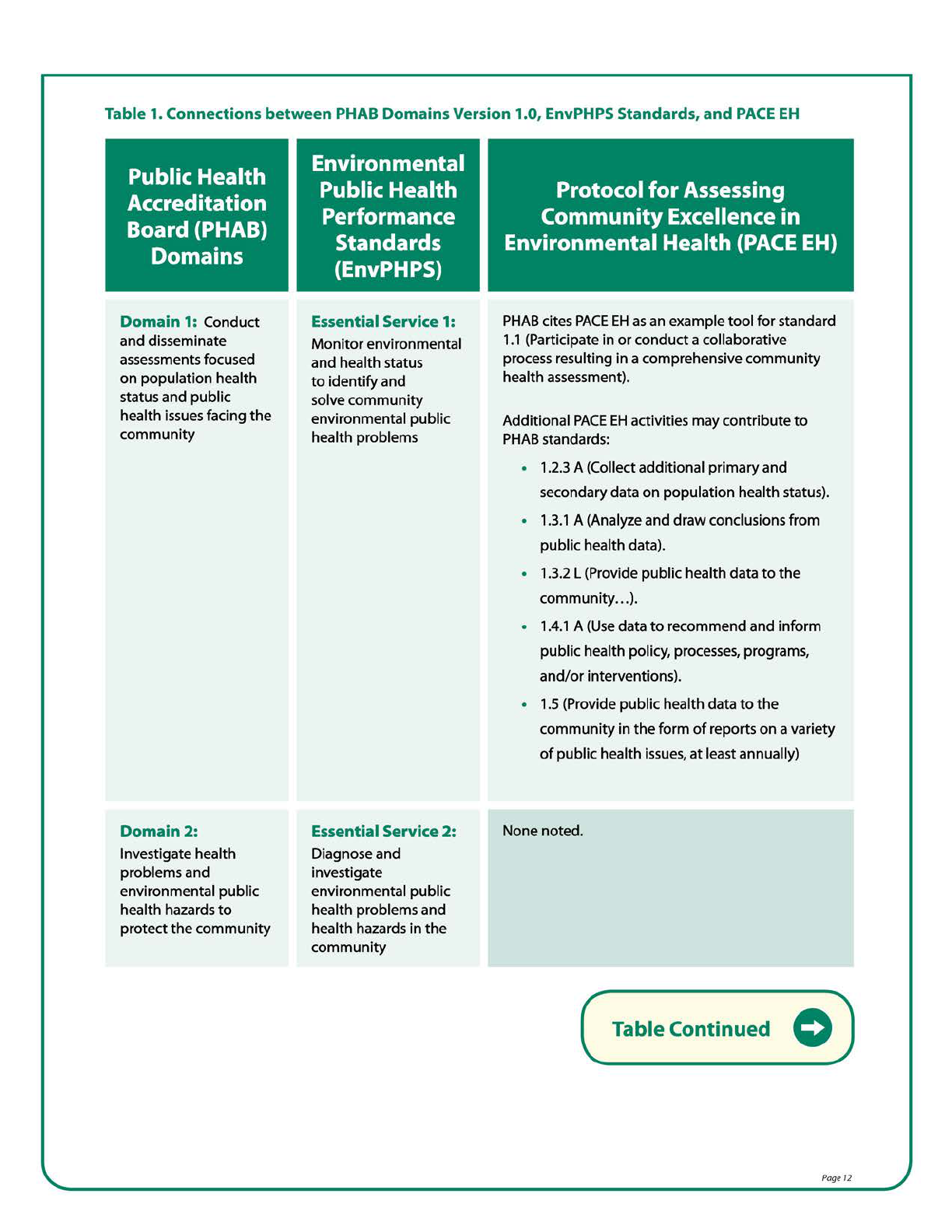
Table 1. Connections
between
PHAB Domains Version 1.0, EnvPHPS Standards, and
PACE
EH
Public Health
Accreditation
Board (PHAB)
Domains
Domain
1:
Conduct
and disseminate
assessments focused
on population health
status and public
health issues facing
the
community
Domain2:
Investigate health
problems and
environmental public
health hazards
to
protect the
community
Environmental
Public Health
Performance
Standards
(EnvPHPS)
Essential Service
1:
Monitor
environmental
and health status
to
identify and
solve
community
environmental public
health problems
Essential Service 2:
Diagnose and
investigate
environmental public
health problems and
health hazards in
the
community
Protocol
for
Assessing
Community Excellence in
Environmental Health
(PACE
EH)
PHAB
cites
PACE
EH
as
an
example tool for standard
1.1
(Participate in
or
conduct a collaborative
process resulting in a comprehensive
community
health assessment).
Additional
PACE
EH
activities may contribute
to
PHAB
standards:
•
1.2.3
A (Collect additional primary and
secondary data on population health status).
•
1.3.1
A (Analyze and draw conclusions from
public health data).
• 1.3.2 L (Provide public health data
to
the
community
...
).
• 1.4.1 A
(Use
data
to
recommend and inform
public health policy, processes, programs,
and/or
interventions).
•
1.5
(Provide public health data
to
the
community
in the form
of
reports on a variety
of
public health
issues,
at
least annually)
None noted.
Table Continued
C)
Page
12
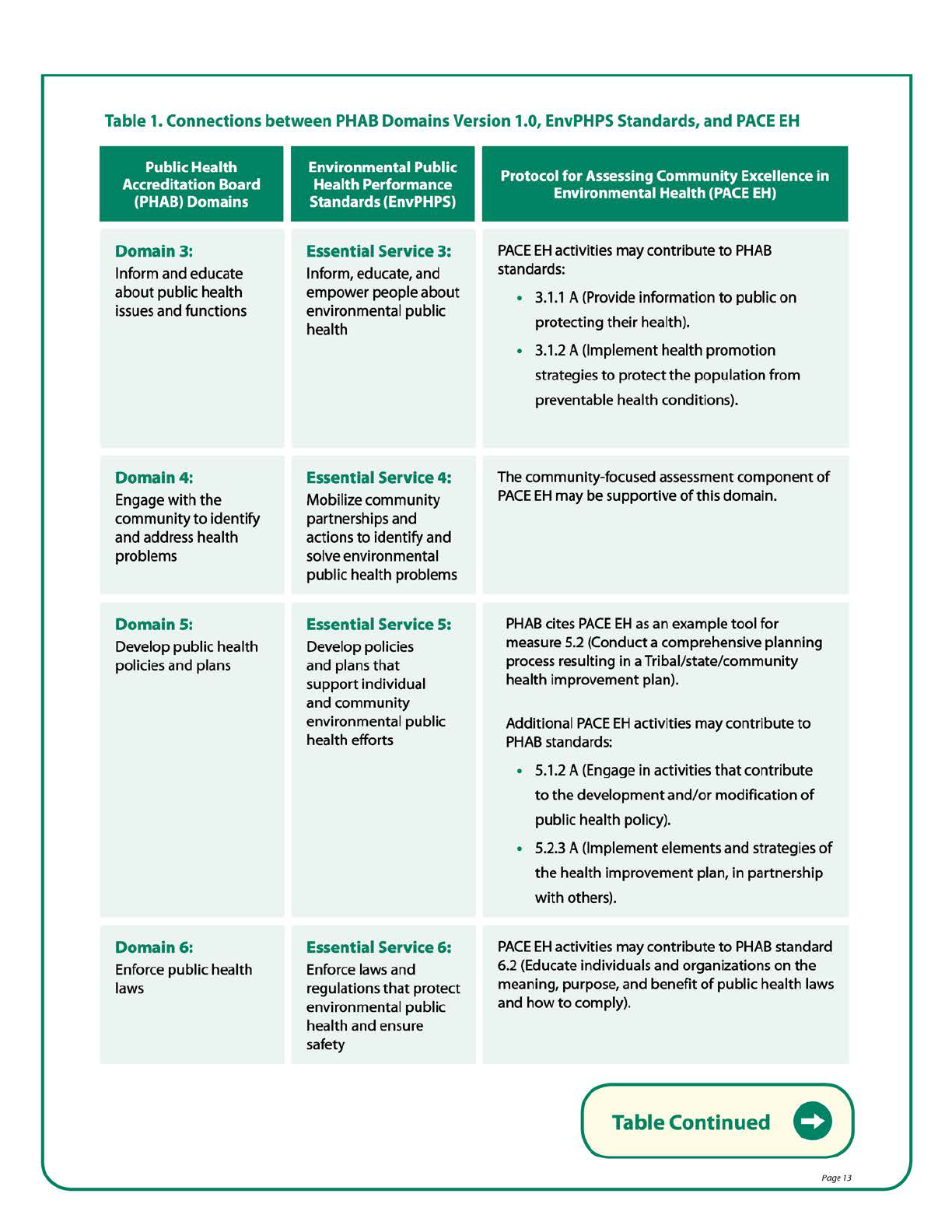
Table 1.
Connections
between
PHAB
Domains
Version
1.0, EnvPHPS
Standards,
and
PACE
EH
Public Health
Accreditation Board
(PHAB)
Domains
Domain3:
Inform and educate
about
public health
issues and functions
Domain4:
Engage
with
the
community
to
identify
and address health
problems
DomainS:
Develop public health
policies and plans
Domain6:
Enforce public health
laws
Environmental Public
Health Performance
Standards
(EnvPHPS)
Essential Service 3:
Inform, educate, and
empower people
about
environmental public
health
Essential Service
4:
Mobilize
community
partnerships and
actions
to
identify and
solve environmental
public health problems
Essential Service 5:
Develop policies
and plans
that
support individual
and
community
environmental public
health efforts
Essential Service 6:
Enforce laws and
regulations
that
protect
environmental public
health and ensure
safety
Protocol
for
Assessing Community Excellence in
Environmental Health
(PACE
EH)
PACE
EH
activities may contribute
to
PHAB
standards:
•
3.1.1
A (Provide information
to
public on
protecting their health).
• 3.1.2 A (Implement health promotion
strategies
to
protect
the
population from
preventable health conditions).
The community-focused assessment component
of
PACE
EH
may be supportive
of
this domain.
PHAB
cites
PACE
EH
as
an example
tool
for
measure
5.2
(Conduct a comprehensive planning
process resulting in a Tribal/state/community
health improvement plan).
Additional
PACE
EH
activities may contribute
to
PHAB
standards:
•
5.1.2
A (Engage in activities
that
contribute
to
the
development
and/or
modification
of
public health policy).
•
5.2.3
A (Implement elements and strategies
of
the
health improvement plan, in partnership
with
others).
PACE
EH
activities may contribute
to
PHAB
standard
6.2
(Educate individuals and organizations on the
meaning, purpose, and benefit
of
public health laws
and
how
to
comply).
Table
Continued
C)
Page
13

Table
1. Connections
between
PHAB
Domains
Version 1.0, EnvPHPS
Standards,
and
PACE
EH
Public Health
Accreditation Board
(PHAB) Domains
Domain7:
Promote strategies
to
improve
access
to
health care services
DomainS:
Maintain a competent
public health workforce
Domain9:
Evaluate and continu-
ously improve health
department
processes,
programs, and inter-
ventions
Domain
11:
Maintain administra-
tive and management
capacity
Domain
12:
Maintain capacity
to
engage
the
public
health governing
entity
Environmental Public
Health Performance
Standards
(EnvPHPS)
Essential Service 7:
Link people
to
needed
environmental public
health services and
assure the provision
of
environmental public
health services when
otherwise unavailable
Essential Service 8:
Assure a competent
environmental public
health workforce
Essential Service 9:
Evaluate effective-
ness,
accessibility, and
quality
of
personal
and population-based
environmental public
health services
Protocol for
Assessing
Community Excellence
in
Environmental Health
(PACE
EH)
PACE
EH
activities may contribute
to
PHAB
standards:
•
7.1.1
A (Convene and/or participate in a
collaborative process
to
assess
the
availability
of
health care services).
• 7.1.2 A (Identify populations
who
experience
barriers
to
health care services).
None noted.
None noted.
None noted.
None noted.
Page
14
